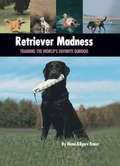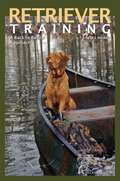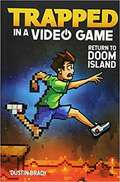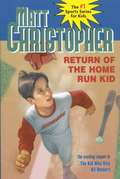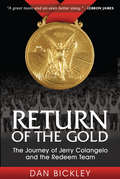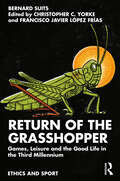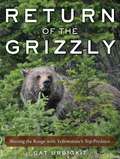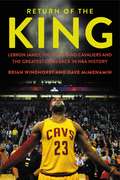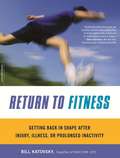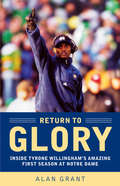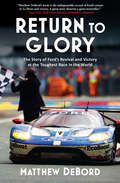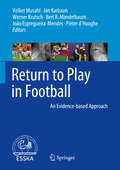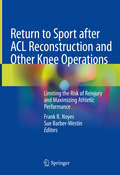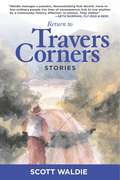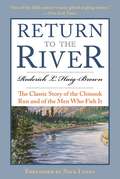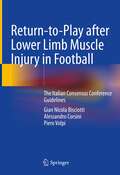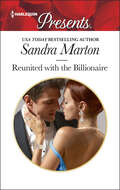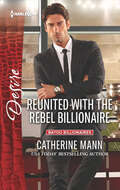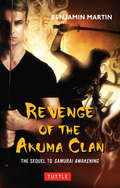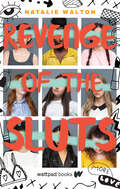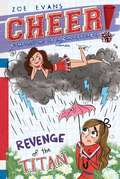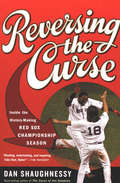- Table View
- List View
Retriever Madness: Training the World's Favorite Gundog
by Nona Kilgore BauerAuthor Nona Kilgore Bauer begins Retriever Madness with a chapter called "Know Your Retrievers," and few know their retrievers like this expert author, trainer, and breeder. Bauer introduces the readers to the six retrievers recognized by the American Kennel Club, among them two of the most popular companion dogs in the world, the Labrador Retriever and the Golden Retriever, along with other superb overachievers: the Chesapeake Bay Retriever, Flat-Coated Retriever, Curly-Coated Retriever, and Nova Scotia Duck Tolling Retriever.Geared toward readers who are interested in working with their retrievers in their bred-for capacity-hunting water fowl and upland game birds-Retriever Madness is the perfect primer to getting started in the field. The book offers advice on selecting a puppy with hunting potential, giving future owners insight on how to evaluate a puppy's birdiness, independence, prey drive, and personality. The chapter on bringing the puppy home gives recommendations for basic training equipment, including leashes, collars, dummies, whistles, starting pistol and the like.Amateur retriever owners who hope to hunt with their dogs will find excellent advice for training for the puppy's first twenty weeks of life, the most critical period for training any puppy. In addition to the basic commands (sit, down, stay), the author also explains the release command, whistle commands, forward and backward heeling, and wait.Four chapters are devoted to beginning field work, presenting diagrams and step-by-step instructions and covering such topics as puppy marks, throwing, water retrieves, steadying, force-fetching, marking, executing blind retrieves and more. The author offers remedies to commonly encountered problems in the field as well as a complete glossary of terminology that all readers will find helpful in understanding the lingo of the field retriever.
Retriever Training: A Back-To-Basics Approach
by Robert MilnerThrough gentle training methods learned from Ray Hunt--the original "horse whisperer"--Robert Milner shows retriever owners how to train the hunting retriever by using its own natural tendencies instead of force. Supplemented with the latest scientific research on how dogs learn, Milner's easy step-by-step training regimen uses positive reinforcement to create the perfect hunting and at-home companion. There is no better training method for the hunter who wants a calm, steady, and obedient retriever.Milner, who has been training retrievers professionally for more than thirty years, reverses the trend of difficult dogs and difficult training methods and offers a system every hunter can easily understand and follow.
Return To Doom Island (Trapped in a Video Game #4)
by Dustin Brady Jesse BradyAlistair Gregory, the man who figured out how to put people into video games, is not what he seems. Jesse Rigsby is sure of that. Jesse’s sure of something else, too—he’s being watched. To unravel the mystery, Jesse’s going to have to transform himself into a superspy with serious retro-gaming skills. Can he pull it off before the bad guys catch on?
Return of The Home Run Kid
by Matt ChristopherSylvester Coddmyer III is having a dismal baseball season until he takes advice from a mysterious ex-ballplayer named Cheeko and starts to play more aggressively.
Return of the Gold: The Journey of Jerry Colangelo and the Redeem Team (Sports Professor)
by Dan BickleySix years after Michael Jordan won his last NBA championship, American basketball hit rock bottom. The perception of NBA players reached an all-time low. Team USA lost three times, disgracing the nation at the 2004 Olympics. With great historical sweep, bringing in the voices of all-time greats like Jordan, Bill Russell, Julius Erving and Jerry West, the book will show how American basketball bottomed out. It will chart the path of Jerry Colangelo, a great sportsman who set out to change the stained image of USA Basketball. And with great insight and fresh detail, it will show how two of the best players in history – Kobe Bryant and LeBron James – spun their own tails of redemption in while winning gold medals.
Return of the Grasshopper: Games, Leisure and the Good Life in the Third Millennium (Ethics and Sport)
by Bernard SuitsIn this sequel to Bernard Suits’ timeless classic philosophical work The Grasshopper: Games, Life and Utopia, published in its full and unabridged form for the first time, Suits continues to explore some of our most fundamental philosophical questions, including the value of sport and games, and their relationship to the good life. In Return of the Grasshopper, Suits puts his theoretical cards on the table, exploring the in-depth implications of his definition of utopia, assessing the merits of a gamified philosophy, and explaining how games can provide an existential balm against the fear of death. Perhaps most importantly, for the first time in print, Suits reveals his underlying worldview: that humanity is forever fated to endure a cyclical existence of privation, brought on by material scarcity, and boredom, resulting from material plenitude. An essential companion to The Grasshopper, this edition includes an introductory chapter that puts Suits’ life and work into context, helping the reader to understand why Suits has had such a profound influence on contemporary philosophy and how his ideas still provide powerful insight into the human condition. This book is important reading for anybody with an interest in the philosophy of sport, leisure and play, political philosophy, ethics, existentialism or utopian studies.
Return of the Grizzly: Sharing the Range with Yellowstone's Top Predator
by Cat UrbigkitConflicts arise when humans and grizzlies are forced into close quarters.The Yellowstone grizzly population has grown from an estimated 136 bears when first granted federal protection as a threatened species to as many as 1,000 grizzlies in a tri-state region today. No longer limited to remote wilderness areas, grizzlies now roam throughout the region—in state parks, school playgrounds, residential subdivisions, on farms and ranches, and in towns and cities throughout the region. Return of the Grizzly tells the story of the successful effort to recover this large carnivore, the policy changes and disputes between bear managers and bear advocates, and for the first time, provides insight to what recovery means for the people who now live with grizzlies across a broad landscape. From cowboys on horseback chased by a charging grizzly, and grizzlies claiming game animals downed by human hunters, to the numerous self-defense killing of grizzlies that occur each year, the manuscript examines increases in conflicts and human fatalities caused by grizzlies in this ecosystem inhabited by humans who live there year-round. Human–bear interactions, grizzly attacks and deaths, avoiding attacks, effects on agriculture, wildlife protesters, the consequences of bear habituation, and more are all covered.
Return of the King: Lebron James, The Cleveland Cavaliers, And The Greatest Comeback In Nba History
by Brian Windhorst Dave McmenaminThe inside story of LeBron James's return and ultimate triumph in Cleveland.What really happened when LeBron James stunned the NBA by leaving a potential dynasty in Miami to come home to play with the Cleveland Cavaliers? How did the Cavs use secret meetings to put together the deal to add star Kevin Love? Who really made the controversial decision to fire coach David Blatt when the team was in first place? Where did the greatest comeback in NBA history truly begin-and end?RETURN OF THE KING takes you onto the private planes, inside the locker-room conversations, and into the middle of the intense huddles where one of the greatest stories in basketball history took place, resulting in the Cavs winning the 2016 NBA title after trailing the Golden State Warriors three games to one. You'll hear from all the characters involved: the players, the executives, the agents, and the owners as they reveal stories never before told. Get the background on all the controversies, the rivalries, and the bad blood from two reporters who were there for every day, plot twist, and social media snafu as they take you through the fascinating ride that culminated in a heart-stopping Game Seven.
Return to Fitness
by Bill KatovskyFrom the coauthor of "Bike for Life" and founder of "Tri-Athlete Magazine," comes an indispensable guide to regaining health and fitness after illness, inactivity, or injury
Return to Glory: Inside Tyrone Willingham's Amazing First Season at Notre Dame
by Alan GrantWith a new afterword, the insider's story of Notre Dame's first black football coach and his amazing debut with the Fighting Irish
Return to Glory: The Story of Ford’s Revival and Victory at the Toughest Race in the World
by Matthew DeBordIn January, 2015 at the Detroit Auto Show, Ford unveiled a new car and the automotive world lost its collective mind. This wasn’t some new Explorer or Focus. Onto the stage rolled a supercar, a carbon-fiber GT powered by a mid-mounted six cylinder Ecoboost engine that churned out over 600 horsepower. It was sexy, jaw dropping, but more than that, it was historic, a callback to the legendary Ford GT40 Mk IIs that stuck it to Ferrari and finished 1-2-3 at Le Mans in 1966. Detroit was back, and Ford was going back to Le Mans. Journalist Matthew DeBord has been covering the auto industry for years, and in Return to Glory, he tells the recent story of Ford. A decade ago, CEO Alan Mulally took over the iconic company, and thanks to a financial gamble and his “One Ford” plan, helped it weather the financial crisis and a stock price that plunged to $1 a share, without a government bailout. It was enough for the company to dream of repeating racing history. DeBord revisits the story of the 1960s, details the creation of the new GT, and follows the team through the racing season, from an inauspicious debut at Daytona where the cars kept breaking down, to glimmers of hope at Sebring, and the team’s first victory at Laguna Seca in Monterey. Finally, DeBord joins the Ford team in Le Mans in June, 2016. This fabled 24-hour endurance race is designed to break cars and drivers, and it was at Le Mans, fifty years after the company’s greatest triumph, that Ford’s comeback was put to the ultimate test.
Return to Play in Football: An Evidence-based Approach
by João Espregueira-Mendes Jón Karlsson Volker Musahl Pieter D'Hooghe Werner Krutsch Bert R. MandelbaumIn this book, leading experts employ an evidence-based approach to provide clear practical guidance on the important question of when and how to facilitate return to play after some of the most common injuries encountered in football. Detailed attention is paid to biomechanics, the female athlete, risk factors, injury prevention, current strategies and criteria for safe return to play, and future developments. Specific topics discussed in depth include concussion, anterior cruciate ligament and other knee injuries, back pathology, rotator cuff tears, shoulder instability, hip arthroscopy, and foot and ankle injuries. The chapter authors include renowned clinicians and scientists from across the world who work in the field of orthopaedics and sports medicine. Furthermore, experiences from team physicians involved in the Olympics, National Football League (NFL), Union of European Football Associations (UEFA), and Fédération Internationale de Football Association (FIFA) are shared with the reader. All who are involved in the care of injured footballers will find this book, published in cooperation with ESSKA, to be an invaluable, comprehensive, and up-to-date reference that casts light on a range of controversial issues.
Return to Sport after ACL Reconstruction and Other Knee Operations: Limiting the Risk of Reinjury and Maximizing Athletic Performance
by Frank R. Noyes Sue Barber-WestinThe wealth of information provided in this unique text will enable orthopedic surgeons, medical practitioners, physical therapists, and trainers to ensure that athletes who suffer anterior cruciate ligament (ACL) injuries, or who require major knee operations for other reasons, have the best possible chance of safely resuming sporting activity at their desired level without subsequent problems. Divided into seven thematic sections, the coverage is wide-ranging and encompasses common barriers to return to sport, return to sport decision-based models, and the complete spectrum of optimal treatment for ACL injuries, including preoperative and postoperative rehabilitation. Advanced training concepts are explained in detail, with description of sports-specific programs for soccer, basketball, and tennis. Readers will find detailed guidance on objective testing for muscle strength, neuromuscular function, neurocognitive function, and cardiovascular fitness, as well as validated assessments to identify and manage psychological issues. In addition, return to sport considerations after meniscus surgery, patellofemoral realignment, articular cartilage procedures, and knee arthroplasty are discussed. Generously illustrated and heavily referenced, Return to Sport after ACL Reconstruction and Other Knee Operations is a comprehensive resource for all medical professionals and support staff working with athletes and active patients looking to get back in the game with confidence.
Return to Toonaklut: The Russell Annabel Story
by Jeff DavisRussell Annabel is one of the most colorful characters ever to set foot in Alaska, this is his story.
Return to Travers Corners: Stories (Lyons Press Series)
by Scott WaldieTravers Corners, if visited by a dedicated urbanite, would be seen as nothing more than a windblown gas station of a town that would make the middle of nowhere look like Metropolis. <P><P>It's a town of 329 beloved residents, from Dolores, who runs the beauty parlor, to Junior McCracken, the worst fisherman to never give up the sport, to Judson C. Clark, boatbuilder and Carrie Creek's occasional guide.But Travers Corners is more than just a gas station of a town. It's a destination for fly fishing-a paradise made of the finest trout waters ever seen, with rivers and creeks sweeping past cattle ranches, tall grasses, and off into the timbered mountains.In Scott Waldie's Return to Travers Corners are stories of small town friendships and fights, of famous fishermen and unlucky anglers, of trout so big they're practically mythical, and of the ones that got away-in love and on the water. The tales of Travers Corners hearken to a simpler, more enticing world of wild places, good deeds, and the friends made along the way.
Return to the River: The Classic Story of the Chinook Run and of the Men Who Fish It
by Jay Cassell Roderick L. Haig-BrownReturn to the River remains one of the finest books ever written about the salmon and has won its place as an angler's and naturalist's classic.Drawn back again to spawn in the stream that hatched them, the deep-sea salmon, the great silver chinooks, return as inevitably as the September rains. Return to the River captures the whole sweep of the chinook migration in every significant detail: the departure seaward of the millions of small fry in the spring of the second year, the saltwater life of the free-swimming schools in the deeps beyond Puget Sound, the later return of the survivors-sixty- and eighty-pounders that leap against every obstacle, striving to complete their lives at last among upland shallows barely deep enough to contain them.Roderick Haig-Brown, observing with the trained eye of the naturalist what he records with a novelist's skill, here sets forth the dramatic life history of one salmon from her hatching through her mating-the fulfillment of her life cycle."The supple, rapid style, vigorous as the great fish itself," wrote Joseph Henry Jackson in the San Francisco Chronicle, "makes this account as easy reading as fiction."Skyhorse Publishing is proud to publish a broad range of books for fishermen. Our books for anglers include titles that focus on fly fishing, bait fishing, fly-casting, spin casting, deep sea fishing, and surf fishing. Our books offer both practical advice on tackle, techniques, knots, and more, as well as lyrical prose on fishing for bass, trout, salmon, crappie, baitfish, catfish, and more. While not every title we publish becomes a New York Times bestseller or a national bestseller, we are committed to publishing books on subjects that are sometimes overlooked by other publishers and to authors whose work might not otherwise find a home.
Return-to-Play after Lower Limb Muscle Injury in Football: The Italian Consensus Conference Guidelines
by Piero Volpi Gian Nicola Bisciotti Alessandro CorsiniReturn to training (RTT) and return to play (RTP) decisions making process in football are currently based on expert's opinion. However, there are no consensus guidelines on evidence-based decision-making. This book provides a framework for evidence-based decision-making both in RTT and RTP following lower-limb muscle injuries sustained in football.Based on the “Italian Consensus Conference (2019) on return-to-play after lower limb muscle injury in football”, it provides a list of RTT and RTP criteria after such injuries compiled by orthopedic surgeons, sports physicians, radiologists, rehabilitation physicians, sport physiologists, general surgeons, family physicians, physiotherapists, physical trainers and psychologists working in elite football in Italy.The book identifies the main criteria for RTT and RTP following injuries involving the most important muscle groups, i.e. quadriceps, hamstring, hip adductor, hip external rotator, iliopsoas and soleus-gastrocnemius.As such it is a valuable reference resource for practitioners making RTT and RTP decisions making process.
Reunited with the Billionaire
by Sandra MartonAn unquenchable desire is reignited between a former Olympic hopeful and her teenage sweetheart in the small Berkshires town of Cooper’s Corner.When Wendy Monroe left Cooper’s Corner she’d been a championship skier in the making . . . and madly in love with Seth Castleman. Until an accident on the slopes shattered her dreams—and her heart.Now Wendy has returned for life-changing surgery and comes face to face with Seth again. He’s more devastatingly handsome than ever, and it soon becomes clear that the chemistry between them still burns hot. Will Wendy overcome the past and be reunited with her billionaire?Originally published as Dancing in the Dark.
Reunited with the Rebel Billionaire: Take Me, Cowboy A Bargain With The Boss Reunited With The Rebel Billionaire (Bayou Billionaires #3)
by Catherine MannIs it a real reunion, or one for the cameras? A passionate and poignant second-chance romance from the USA Today–bestselling and award-winning author!New Orleans football star Henri Reynaud won’t let his career go down without a fight. If the only way to win is to reconcile with his estranged wife, he’ll do what it takes. But spending time with Fiona Harper-Reynaud isn’t just some ruse. The sultry beauty belongs in his bed.Fiona doesn’t know where her sexy husband’s public act ends and his real feelings begin. Can she afford to fall a second time for the man who was twice chosen for the honor of “Hottest Athlete of the Year” —the man every female wants? Worse yet, is he motivated only by a sense of duty after she survived a serious illness—an illness that could return any day?But for all Fiona’s doubts, one thing is undeniable—their attraction has never flared hotter . . .Praise for the novels of RITA Award winner Catherine Mann“Marvelous.” —Publishers Weekly“Brilliant . . . gripping emotion.” —New York Times–bestselling author Dianna Love“A great read.” —Booklist
Revenge of the Akuma Clan
by Benjamin MartinIt's time for Revenge. Benjamin Martin, author of the 2011 Amazon Breakthrough Novel Award semi-finalist Samurai Awakening, returns with another masterpiece of young adult fiction and the next installment in his riveting shapeshifter saga.American teenager David Matthews has more to deal with than the average exchange student living in Japan--a lot more. In Samurai Awakening, David woke one morning to discover that he?d been empowered and possessed by the tiger god Kou. Now a Jitsugen Samurai in Revenge of the Akuma Clan and able to take on Kou's form, David must use his new abilities to protect Japan from the terrifying evil creeping across the land--and waiting for him to fail.As his relationships, especially with Rie his host sister, grow uncertain, he must forge deeper connections with Kou, the tiger god that resides with him, and form new alliances if he hopes to hold back the return of Japan's ancient enemies. It is up to David to stop the powerful and vengeful Akuma Clan--and time is running out.
Revenge of the Sluts
by Natalie WaltonDouble standards are about to get singled out.In this stunning debut, author Natalie Walton tackles privacy and relationships in the digital age.As lead reporter for The Warrior Weekly, Eden has covered her fair share of stories at St. Joseph Secondary. And when intimate pictures of six female students are anonymously emailed to the entire school, Eden is determined to get to the bottom of it.In tracking down leads, Eden is shocked to discover not everyone agrees the students are victims. Some people feel the girls "brought it on themselves." Even worse, the school’s administration seems more concerned about protecting its reputation than its students.With the anonymous sender threatening more emails, Eden finds an unlikely ally: the six young women themselves. Banding together to find the perpetrator, the tables are about to be turned. The Slut Squad is fighting back!
Revenge of the Titan
by Zoe Evans Brigette BarragerMaddy's cheerleading squad is almost ready for big competition--but first she must figure out if her new friend is really a frenemy.The Grizzlies are finally facing their first competition--Get Up and Cheer! Maddy is super excited for the competition, and the Grizzles have been training hard and look better than ever. But life's not all pom-poms and sunshine for Maddy. For one thing, she's got to figure out why she's suddenly Public Enemy #1, according to mean girl Clementine Prescott. Maddy is pretty sure her budding friendship with Katie Parker (Clementine's BFF) might have something to do with it, but given the fact that Katie still refuses to acknowledge her in public, it's not like Maddy can count on Katie for any real support. Once thing is for sure....If anyone can handle all this drama, it's Maddy!
Revenge of the Trout Zombies
by Bruce CochranAll day you drift through some of the most beautiful scenery in the world, yet you see it not, writes Bruce Cochran.The majestic bluffs, the soaring bald eagle, the snow-capped mountains all go unnoticed because your world consists only of your strike indicator.You stare at it, hypnotized, as it floats in the current, carrying with it all your hopes, your dreams, and yes your humanity.You have ceased to function as a living person.Yes, you have become a TROUT ZOMBIE!In this, his seventh book, Cochran uses hilarious words and cartoons to expose the follies and foibles of fly fishing.All elements of this hugely popular sport are lampooned, including the equipment, the characters, the flies,even the clothing.(Rule #1: No more pink shirts. And yes, they're PINK! Not coral or salmon. If you want to betaken seriously, stop buying your clothes at Victoria's Secret.)
Reverse Shoulder Arthroplasty: Current Techniques and Complications
by Stefano Gumina Federico Alberto Grassi Paolo PaladiniThis handbook fully investigates reverse shoulder arthroplasty (RSA), presenting all the recent advances in the field to enable shoulder surgeons to treat patients with complex conditions, such as rotator cuff tears and instability, failed surgery and combined arthritis, or proximal humerus neoplasia.Reverse shoulder arthroplasty is becoming increasingly common because conventional total shoulder replacement may cause pain, loss of strength, simple or complex disabilities as well as limited motion, reducing general quality of life. The goal of a reverse prosthesis is to restore a painless, biomechanically valid joint. Drawing on the results of recent studies, the book covers all relevant aspects of RSA, including basic science, pathogenesis, clinical and instrumental evaluation, surgical techniques and complication management, helping readers to better understand when and how reverse shoulder arthroplasty should be implanted and what to do in cases of poor results. Written by leading shoulder specialists, the book provides surgeons and rehabilitation specialists, as well as residents and shoulder fellows, with a valuable, state-of-the-art guide for clinical practice.
Reversing the Curse: Inside the 2004 Boston Red Sox
by Dan Shaughnessy&“A true insider&’s perspective on the 2004 Red Sox&” and their World Series win, from the bestselling author of Curse of the Bambino (USA Today). On October 27, 2004, the Red Sox won their first World Series Championship in eighty-six years—breaking the infamous Curse of the Bambino and giving diehard fans the thrill of a lifetime. Reversing the Curse preserves one of the greatest stories in sports history with an absorbing account of the team—a raggedy lineup of motorcycle-riding, whiskey-drinking rogues—and the key events that led to their incredible championship victory. A more epic sports saga could not have been invented: Here we have the curse that began with Babe Ruth; a team of comeback kids determined to prove their mettle; the perennial rivalry against the Yankees; and a historic win that was celebrated around the world. Dan Shaughnessy captures the Sox triumph in all its drama and euphoria with penetrating insight, a keen sense of history, and unparalleled insider access. With photographs by the Pulitzer Prize–winning photographer Stan Grossfeld, Reversing the Curse is the definitive record of a landmark moment in baseball history. &“[Shaughnessy is] adept at capturing the mood, the emotion, the palpable feel of the Boston-New York showdown.&” —The New York Times &“In story after story of near-triumph, the book should delight the team&’s most fanatically loyal followers.&” —Publishers Weekly
